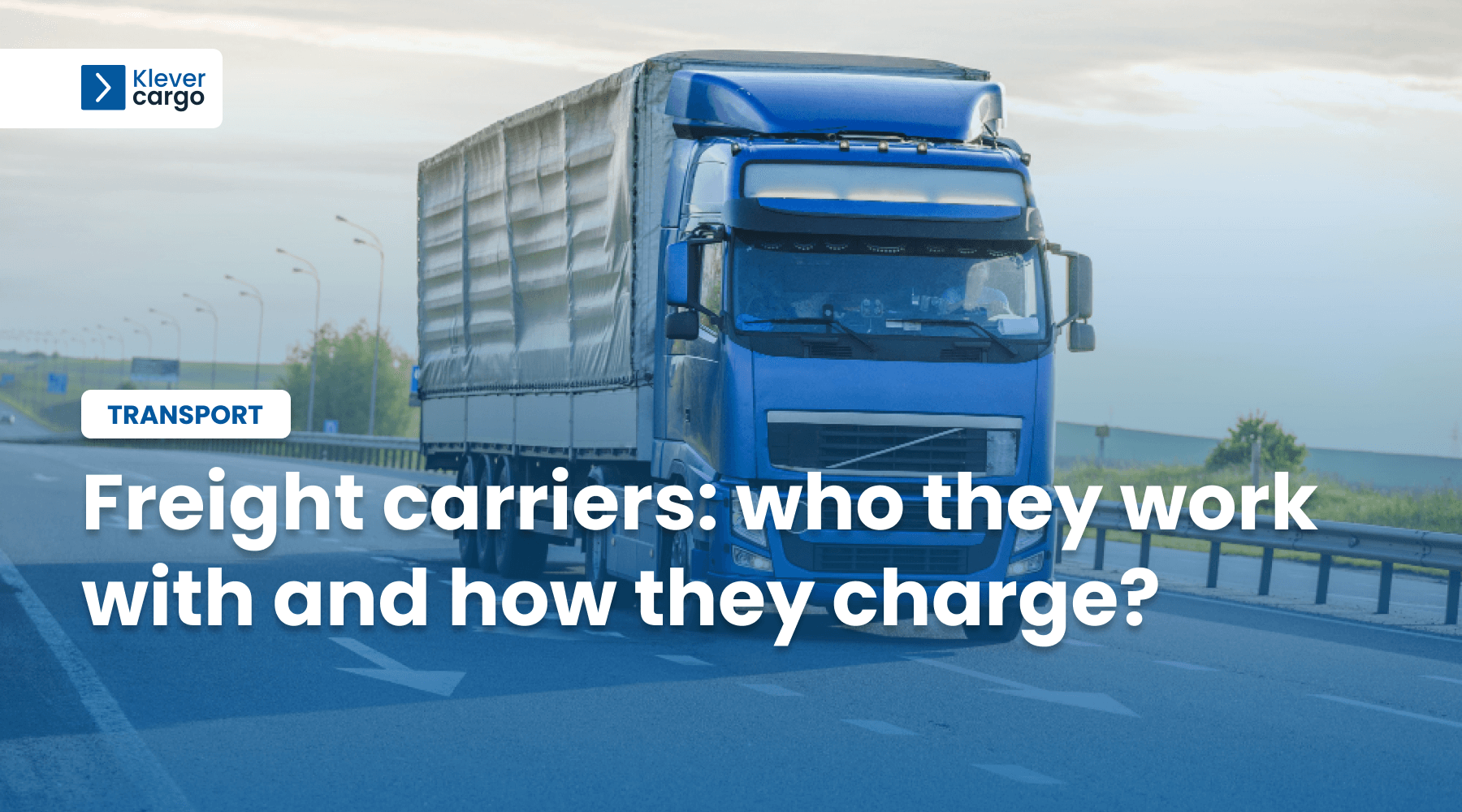A freight carrier is a company that specialises in transporting freight from one location to another. It achieves this by using various modes of transport, such as trucks, trains, ships, and planes. Carriers play a vital role in the transportation industry by facilitating the movement of goods from manufacturers and distributors to retailers and, ultimately, consumers.
Who is called the carrier?

In the transportation industry, the term “carrier” refers to a company or individual that handles the physical transportation of goods. This includes companies that specialise in shipping and logistics, as well as vehicle drivers.
You can distinguish two types of carriers based on who they work with – common carriers and contract carriers.
Common carriers offer services to the general public or a wide range of customers.
Contract carriers operate under long-term contracts with individual customers or businesses. Both types work closely with shippers, freight brokers, and dispatchers in the industry. Let’s take a closer look at the connections between them.
Freight carriers and shippers
Carriers are the ones who transport cargo, but they need to find it to do the job, to begin with. The shipper is the one that enlists the carrier to transport specific goods, such as freight. If you’re a freight carrier, your goal is to connect with shippers to provide you with cargo for your trip.
The shipper and carrier create a contract to transport freight from point A to point B for a charge. The shipper contacts the carrier representative (often through a broker) to ease this transaction. Usually, this includes the shippers’ specific desires and requirements for the shipment.
Freight carriers and brokers
In the transportation industry, freight brokers are like intermediaries. They “broker” a deal between shippers and carriers to benefit both groups. A broker has contacts with reliable carriers, and they offer shippers suitable candidates for their needs.
The broker isn’t responsible for the shipments or payments related to the transportation process. Instead, their responsibility is to maintain the relationship between the shippers and carriers. The broker facilitates the contract and ensures both parties can reach agreements and make compromises when needed.
While brokers are used frequently in the transportation industry, they aren’t essential. It’s possible to find shippers and carriers independently of brokers and avoid paying additional fees. If you, as a carrier, need to find cargo, there are other options for connecting with shippers. The way this works on KleverCargo is pretty straightforward. All you have to do is:
- Log in to your KleverCargo account

- Post a new offer by clicking on Create New in the top left of the page
- Choose the Transport Offer option

- Enter all the relevant information for the route as well as the date and type of transport that you offer, plus input vehicle info and any extra terms you have

- Click Create Transport Offer
Once complete, you wait for a shipper to click on the offer and reserve a spot on your transport. This allows you to circumvent the waiting and negotiating you would typically do with a broker. You can choose your terms and rates and contact a suitable shipper; no broker is required.
Freight carriers and dispatchers
The relationship between freight carriers and dispatchers is essential for freight transport. A dispatcher acts as a crucial link between shippers and carriers, ensuring that transport is efficient and on time. They bridge the gap between the two parties, coordinating and optimising transportation. While this may sound like a broker in a broad sense, these two roles are far removed from each other.
Dispatchers have a hands-on role when it comes to the shipment. They track the vehicle as it moves, providing updates and estimated delivery time. This allows carriers to focus on their core competencies of transporting goods while dispatchers handle the logistical and administrative aspects of the process. Their mission is to ensure that cargo is transported seamlessly from start to finish, with minimal delays or problems on the road.
Dispatchers represent the carrier in this transaction. As a result, they share part of the responsibility for shipments. They receive a percentage of the carrier’s rate for their services. At the same time, they help carriers negotiate better prices for transportation.
What is the role of a freight carrier?

The role of freight carriers in the transportation industry is crucial to ensuring the smooth flow of goods from one point to another. Essentially, freight carriers are responsible for transporting freight and ensuring timely delivery. However, the process is more complex than it seems. It requires meticulous planning and execution, including vehicle maintenance and route optimisation.
Besides operational tasks, freight carriers manage administration for the transaction. This includes managing paperwork, ensuring compliance with regulations, and maintaining open communication.
How do freight carriers charge?

A freight rate, or freight charge, is the amount a freight carrier charges for transportation services. Negotiating favourable freight rates is a key part of managing logistics costs for shippers. For carriers, choosing a good freight rate is necessary for profitability and competitiveness in the market.
Freight rates are determined based on multiple factors, including the delivery distance, the cargo’s weight and volume, and the transportation mode used. The cost may include additional charges for specialised handling or other value-added services.
Weight and size
Size and weight are two of the most significant factors influencing freight rate calculation. The larger and heavier the shipment, the higher the cost of transportation. This is because larger and heavier loads require more transportation resources, such as larger trucks and more fuel. The size is determined by the shipment’s dimensions (height, length, and width) or how much space it takes up in a truck.
Dimensional Weight is another factor that is used in freight rate calculations. It is a pricing technique freight carriers use to account for the space a shipment occupies in relation to its weight. It is calculated by multiplying the shipment’s dimensions and dividing the result by a DIM divisor number (which can vary from 139 to 166). If the resulting number exceeds the shipment’s actual weight, then that number is used to calculate the freight rate. The exact weight is used to calculate the rate if the number is smaller.
Distance
The delivery distance can impact freight rates in multiple ways, including fuel costs, driver wages, and tolls or taxes. Some regions may be more challenging or costly to access, which can result in higher freight rates. For example—shipments from a warehouse to a remote area may require additional handling. International shipping can influence the cost of tolls and taxes significantly.
Freight class
Every shipment has a freight class which influences its cost. The classification system considers the above factors and adds more to gauge the cost of moving freight. The factors that determine freight classification include:
- Density
- Stowability
- Type of packing
- Shipment vulnerability
- The total value of the shipment
Here’s how that would look in practice. Say you want to transport a valuable, dense shipment that requires care. The carrier will perform its calculations and determine a relatively high freight class. As a result, you’ll pay more than you would for a different shipment with identical weight and dimensions.
The difference between freight carriers and freight forwarders

Freight carriers and freight forwarders are two distinct entities in the transportation industry. Though they are often confused with one another, they have different roles in managing freight.
A freight carrier handles only the transportation of a shipment they are responsible for. A freight forwarder, on the other hand, acts as an organiser. It oversees transportation and acts as an intermediary between shippers and carriers.
A freight forwarder can contract with a carrier or act as a carrier independently. They can use their carrier connections to assemble and merge shipments. They can also provide insurance coverage options. As freight forwarders are involved in cargo transportation, they offer warehouse storage.
Important link of the transport industry

Freight carriers are critical entities in the transport industry that play a vital role in bridging the gap between shippers and receiving customers. They work closely with shippers, brokers, and forwarders to ensure the logistics chain runs smoothly. The primary goal of carriers is to connect with shippers and ensure they can transport freight to customers quickly and cost-effectively.
An account on KleverCargo can make it easier for shippers to find freight carriers for their cargo. To improve your shipping experience, register today and connect with shippers and carriers throughout Europe. If you want to learn more about how to use our platform to transport freight, check out short and simple tutorial.


